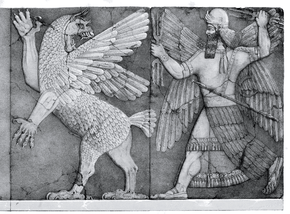Ninkasi
Ninkasi is the tutelary goddess of beer in ancient Sumerian religious mythology.
| Part of a series on |
| Ancient Mesopotamian religion |
|---|
 Chaos Monster and Sun God |
|
Seven gods who decree
|
|
Other major deities |
|
Demigods and heroes
|
| Related topics |
Her father was the King of Uruk, and her mother was the high priestess of the temple of Inanna, the goddess of procreation.[1] She is also one of the eight children created in order to heal one of the eight wounds that Enki receives. Furthermore, she is the goddess of alcohol. She was also born of "sparkling fresh water" . She is the goddess made to "satisfy the desire" and "sate the heart." She would prepare the beverage daily.
Hymn to Ninkasi
The Sumerian written language and the associated clay tablets are among the earliest human writings. Scholarly works from the early 1800s onward have developed some facility translating the various Sumerian documents. Among these is a poem with the English title, A Hymn to Ninkasi. [2]. The poem is a recipe for brewing beer.[3] It can be argued that the art of brewing is broken down and explained in order to be passed down from generation to generation. Furthermore, the Hymn to Ninkasi is the oldest record of a direct correlation between the importance of brewing, and the responsibility that women had with regard to supplying both bread and beer to the household. Ninkasi is female, and the fact that a female deity was invoked in prayer with regards to the production of brewed beverages illustrated the relationship between brewing and women as a domestic right and responsibility.[1] The repetitive nature suggests that it was used as a tool in order to pass down information as a way of learning. The poem, from circa 1800 BC, explains that grain was converted into bappir[1] bread before fermentation, and grapes as well as honey were added to the mix. The resulting gruel was drunk unfiltered, hence the need for straws.[1] A translation from the University of Oxford describes combining bread, a source for yeast, with malted and soaked grains and keeping the liquid in a fermentation vessel until finally filtering it into a collecting vessel.[4]. See also[5]
Other references to Ninkasi
Ninkasi appears several times in this collection.
In the poem Enki and Ninḫursaĝa, Enki states that his mouth (ka) hurts him, as it gave birth to Ninkasi; Ninḫursaĝa, explaining the domains over which her children will rule, says:
- "Ninkasi shall be what satisfies the heart"[6]
In Lugalbanda in the mountain cave, the king Lugalbanda falls asleep in a cave, where thanks to:
- "Ninkasi's wooden cask (i.e. with the help of beer), sleep finally overcame Lugalbanda"[6]
In Lugulbanda and the Anzud bird, the king, once again alone in the mountains, vows to entertain the Anzud bird and his family at a banquet, with assistance from
- "Ninkasi the expert who redounds to her mother's credit. Her fermenting-vat is of green lapis lazuli, her beer cask is of refined silver and of gold. If she stands by the beer, there is joy, if she sits by the beer, there is gladness; as cupbearer she mixes the beer, never wearying as she walks back and forth, Ninkasi, the keg at her side, on her hips; may she make my beer-serving perfect." [6]
She appears "in her vat" in the fragmentary translation of A lullaby for a son of Šulgi[6] and is referred to in another fragmentary poem, A praise poem of Išme-Dagan, in the context of
- "delicious beer mixed with aromatic cedar essence" [6]
In The debate between Grain and Sheep, Grain says to Sheep:
- "When the beer dough has been carefully prepared in the oven, and the mash tended in the oven, Ninkasi (the goddess of beer) mixes them for me while your big billy-goats and rams are despatched for my banquets."[6]
In The debate between Winter and Summer, one of the disputants (the fragmentary nature of the translation makes which one uncertain), states:
- "I am Ninkasi's help, for her I sweeten the beer, with as much cold water, the tribute of the hills, as you brought."[6]
The Drinking song details a ritual:
- "You have poured a libation over the fated brick, and you have laid the foundations in peace and prosperity - now may Ninkasi dwell with you! She should pour beer and wine for you! Let the pouring of the sweet liquor resound pleasantly for you!"[6]
Finally, from this collection, a fragment remains in The instructions of Šuruppag:
- "My little one ……. The beer-drinking mouth ……. Ninkasi"[6]
Modern Uses
Ninkasi Brewing Company in Eugene, Oregon takes its name from the goddess Ninkasi.
Ninkasi Fabrique de Bière in Lyon, France is named for the goddess Ninkasi.
The Ninkasi Fan Club is a brewing society in Nelson, British Columbia.
Ninkasi Simple Malt is a microbrewery in Quebec, Canada.
Ninkasi in Navàs is an ecofemninist microbrewery, takes its name from the goddess Ninkasi.
Ninkasi Rentals & Finance based in United Kingdom is named after the Ninkasi goddess and specialises in renting Fermenting Vessels/Urinals.[7]
See also
- Gambrinus
- 4947 Ninkasi
- Ninkasi Award
- History of beer
References
- Gately, Iain (2008). Drink: A Cultural History of Alcohol. New York: Penguin Group. p. 5. ISBN 978-1-592-40464-3.
- Prince, J. Dyneley (1916). "A Hymn to Ninkasi". The American Journal of Semitic Languages and Literatures. 33 (1): 40–44. doi:10.1086/369806.
- "Discover the Oldest Beer Recipe in History From Ancient Sumeria, 1800 B.C." Open Culture. 3 March 2015. Retrieved 29 June 2016.
- "ETCSLtranslation : t.4.23.1". University of Oxford. Retrieved 9 February 2011.
- Hymn to Ninkasi, Goddess of beer. "Hymn to Ninkasi". Ancient History Encyclopedia. Retrieved 31 January 2020.
- "ETCSL". Electronic Text Corpus of Sumerian Litereature. Retrieved 1 February 2020.
- Ninkasi Rentals & Finance https://www.ninkasirentals.co.uk/about. Retrieved 22 October 2019. Missing or empty
|title=(help)
_-_EnKi_(Sumerian).jpg)